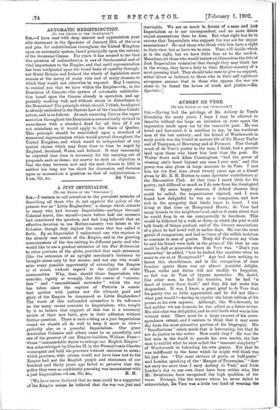AUBREY DE VERB.
[To THE EDITOR OF TUE "SPECTATOR."1 Sts,—Having had the privilege of Mr. Aubrey de Vere's friendship for many years, I hope I may be allowed to describe without too large an intrusion on your space the impression made upon me by the venerable poet. He was loved and honoured, it is needless to say, by the worthiest men of the last century; and the friend of Wordsworth in early youth was the friend in mature life of Si Henry Taylor and of Tennyson, of Browning and of Patmore. Fine though much of de Vere's poetry is, the man, I think, had a greater bold upon those who knew him best than the poet. Sir Walter Scott said Allan Cunningham " had the power of winning one's heart beyond any man I ever met," and this power was also given in large measure to de Vere. I met him for the first time about twenty years ago at a dinner given by Mr. R. H. Hutton to some Speetatdr contributors at the Devonshire Club. At that time I cared little for his poetry, and differed as much as I do now from his theological views. By some happy chances, if indeed chances they could be called, the acquaintance- ripened, and I soon found how delightful he was as a companion, and how rich in the eympathy that binds heart to heart. I was living at that time on Hampstead Heath ; de Vere bad many friends in the neighbourhood, and so it came about that he would drop in on me unexpectedly to luncheon.' This would be followed by a walk or drive, in which the poet would talk freely of things poetical and of the literary association§ of a place he had loved well in earlier days. He was the most genial of companions, and had no trace of the selfish isolation so common in men of genius. Truly did Pattnore say when he and his friend were both in the prime of life that no one could be dull or miserable where de Vere was. " Don't 'you remember," he added, " bow he looked like sunshine when he came to see us at Hampstead?" Age had done nothing to lessen this cheerfulness, and in his recognition of once familiar sports there was an almost youthful delight. Those walks and drives will not readily be forgotten, so full was de Vere of bygone memories. No doubt, like other men, he had his troubles, but he had heart of leisure from itself," and they did not make him despondent. It was, I know, a great grief to de Vere that his poetry was so little appreciated, and he did not like— what poet would 9—having to reprint the latest edition of his poems at his own expense. Although, like Wordsworth, he had neither wit nor humour, be was gifted as a letter-writer. His chit-chat was delightful, and be sent forth what was in him without stint. There must be a large amount of his corre- spondence extant, and I venture to think that it may some day form the most attractive portion of his biography. His " Recollections " relate much that is interesting, but they do not do justice to the writer. How could they ? He was the last man in the world to parade his own merits, the last man to exhibit what be once called the "innocent simplicity" of Wordsworth in belauding his own genius. Not that- he was indifferent to the fame which he might well think was his just due. " The most envious of poets, or half-poets," said Lander, speaking of the " Masque of Proserpine," "does not envy me more than I envy Aubrey de Vere," and from Landor's day to our own there have been critics who, like Mr. Swinburne, have recognised the high qualities of his verse. Perhaps, like the master whom he never failed to ack,n9wiedge, De Vere was e, little too fond of wearing the robes of the preacher or the prephet. He was apt to forget that a poet's noblest lessons must be taught indirectly. "'I am doing," he wrote, " what in me lies to keep alive poetry with a little conscience in it If I fail in that attempt I shall not fret about it. Others will do later whatI had 'aimed at doing, and probably do it better." It was this conscien- tiousness that led him sometimes to choose themes for song too obscure and remote to attract even the "fit audience" for which a poet writes. De Vere was—shall I say for a poet ?—a very modest man. He loved his art, and poetry was doubtless his solitary pride ; but he had room for other loves, and never could it be said of him, as it was said of Pope, that he would sacrifice a friend to a couplet. I am glad in recording these imperfect memories of a man whom to know was " a liberal education" to bear witness to his unfailing charity. It seemed to me that while there was ample room in his heart for whatsoever things are lovely and of good report, there was absolutely no room for any un- worthy feeling. I remember, too, how unfailing was his courtesy, and how sweet the. temper that nothing seemed to ruffle. De Vere was a true Christian gentleman. He lived to a great age, and had lost long since the friends who were best able to estimate his worth. Some there are still who loved the man far more qualified than I am to do honour to his memory. But sincere words may be welcome, no matter from whom they come ; and so I leave this brief and most imperfect notice of a good man and true poet without







































 Previous page
Previous page